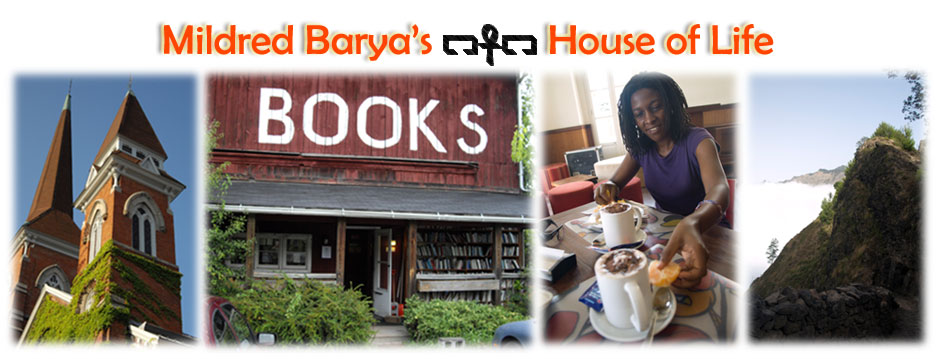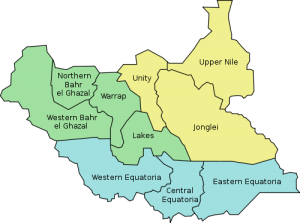How history changes, and geography too! Before South Sudan became an independent nation, Sudan was above Uganda but that didn’t make it East African. We knew Sudan regionally belonged to North Africa, and was/is at times categorized under Middle East. Proudly or in denial—depending on the side you’re on—most folks from North Africa will not admit that they’re North Africans. They’ll let you know they’re Middle Easterners and yes, Arab. It’s a little strange now to read about S Sudan as: “a landlocked country in East Africa.” That used to be us. Uganda was the landlocked country in East Africa.
S Sudan currently occupies a very interesting place/position. If you don’t mind the geography lesson, to the east is Ethiopia, southeast, Kenya, to the south, Uganda, southwest, DR Congo, west, Central African Republic and to the north, Sudan. I have a feeling it’s seated on the edge of its pants. Wouldn’t you if you were where it lies now? One has to pray that this landlocked country thrives. It is possible that peace in S Sudan might quickly translate into peace in the neighboring regions. The good news—it is rich, immensely so, has a portion of the Nile that’s sustained millions for centuries, and it’s the size of Texas. The latter took me by surprise. After the split from Sudan, you’d think S Sudan would be small. Nope. Texas it is.
I hope it wouldn’t drop Arabic so quickly however painful it reminds folks of their oppressors. I think it’s good to speak your enemy’s language, and communication in today’s world is much easier if one is fluid in various languages. Given other challenges set before S Sudan, I like its Motto: Justice, Liberty, Prosperity. Those are ideal and tangible truths one can reach or aim for without getting lost in the fog of what they might mean. I find them clear and clean as statements. Phrases can be hard to pin down. In God We Trust, for instance. For God & My Country. Beautiful as they sound, they present the first challenge of trying to figure out who this God is in a population that does not pledge allegiance to one and the same God. Simply put, nations by composition have the secular, the sacred, multiple and diverse identities, beliefs, practices, cultures…it makes me think of a forest with evergreens, eucalyptus, mahogany, ebony, cedar, acacia, and so on. Imagine what would happen if the evergreens were to declare a state/forest of evergreens regardless of the other types of trees living in that forest. It would be confusion and division, open or silent war in the name of trying to have everyone on board in support of one belief. Much as there might be a universal approach to God, the trust, understanding and experience are so personal so it’s not right to subject all folks under one assumed notion of God.
To complicate this further, some people’s God is one of chaos and war. Others he’s dual, (male and female balancing) or he’s one and three—the trinity—and still for many God is simply Presence or Absence, Peace or Judgment…and what might be different faces of the same coin. So if folks who serve the God of chaos and war become leaders (I’m tempted to mention some countries here but I’ll resist) subjecting everybody to put their ‘trust’ and country in that God becomes difficult especially for those who believe differently. But it’s possible to agree on justice (again not the Sharia kind but human kind. Avoid religious affiliation.) And it’s also possible to come to an understanding of the definition of liberty and prosperity. I’m wary of religious states. Think Pakistan, Afghanistan, Somalia, Yemen, Saudi Arabia, and so on where it’s out of question for Christians, Buddhists, Bahai’s and other non-Moslems to practice. You easily slide into fundamentalism, tyranny, alienation and division. That’s the trouble with whole mass Islamization, Christianization, Zionism, Communism, tribalism, ethnicism, excetera. (I’ve realized the word ethnicism doesn’t actually exist. Why? Don’t we all know what it means?)
It’s probably taken S Sudan too long to be independent because Sudan was busy trying to create an Islamic state but in the process managed to create the Darfur crisis and anarchy in other regions that are now part of S Sudan. Other examples? Israel is a Jewish state. Really? And look how much peace/war since the creation of a Jewish state. Zion as a word is even more frightening. How do you bring everyone under that? I’ve interacted with secular Jews and Christian Jews and African Jews who don’t subscribe to a Zion state and will do everything to resist its impositions and suppositions.
A look at Uganda, my country that claims to be a Christian state (For God & My Country is our motto.) If only you knew! Witchdoctors, magicians, murderers, cultists, corrupt politicians, dictators, warmongers, worshippers; true and false, thrive there and you tell me it’s all For God and My Country? I don’t want to sound pessimistic but something that isn’t about to change is our diversity. In reflection of that I wish our motto was something we could touch as masses and maybe, just maybe, we’d all be working towards that goal that’s both practical and ideal. The God bit would stay personal, spiritual, communal and experiential. I don’t think there will ever be a country that agrees on God, but it might agree on creating a vibrant civil society, a free nation devoid of hunger and human rights abuse. Once you have a vibrant civil society where everyone participates and engages with the issues at hand, chances are communities would be empowered, liberated and inspired and that would glorify God. The other way round presents a roadblock right away.
You have to love a country like Bangladesh for coming up with nationalism, secularism, socialism, and democracy as their motto. Not easy to achieve but possible. I’ve done a quick google search on country mottos so brace yourself for the strangest: Bermuda: Whither the Fates Carry Us. Canada: From Sea to Sea. Luxembourg: We wish to remain what we are. New Zealand, Thailand and Romania have none, while Poland and Portugal have no official one.
I got a kick the first time I was in Botswana and discovered their motto, Pula, meant Rain and at the same time was the country’s currency. Eventually it made sense that they’d cry Rain because rainfall is rare. So it’s precious. And linguistically they tied it to their currency, another precious thing so it’s no wonder that the country for a long time has enjoyed economic growth, good governance in the real sense of the word, and is the only African nation I know that has no debt burden and contributes money to eliminate other African nation’s debts.
I’ve noticed many mottos do aspire to reach God. Partly because they’re Latin in foundation, and also at the time that nations were forming, God was the highest form of expression or aspiration to aim for, and folks could only reach him through a priest, a medium or intense sacrifice aka death. However, in terms of governance and treating one another with respect (men, women and children) they seemed to know what to do and they had less challenges as to what comprised a good or great nation. And us? Nowadays we can easily reach God (I mean we don’t really need a priest, medium or other weird sacrifices) but the simple, basic human needs seem to elude us. We have too much chaos; pure anarchy coupled with ignorance. We know yet we don’t know.
I’m glad S Sudan, new as it is, isn’t tempted to try and create a Christian state, Islamic, Animist or who knows what. It would be recipe for failure. Darfur is predominantly Moslem while Juba is Christian. Other regions have some Christians, some Moslems and some… I wish them well as they focus on Justice, Liberty, and Prosperity. It will take endurance, tolerance, hard work, perseverance and an indomitable will. S Sudan has already showed us they have that. Best of luck.


2 Responses to S Sudan State